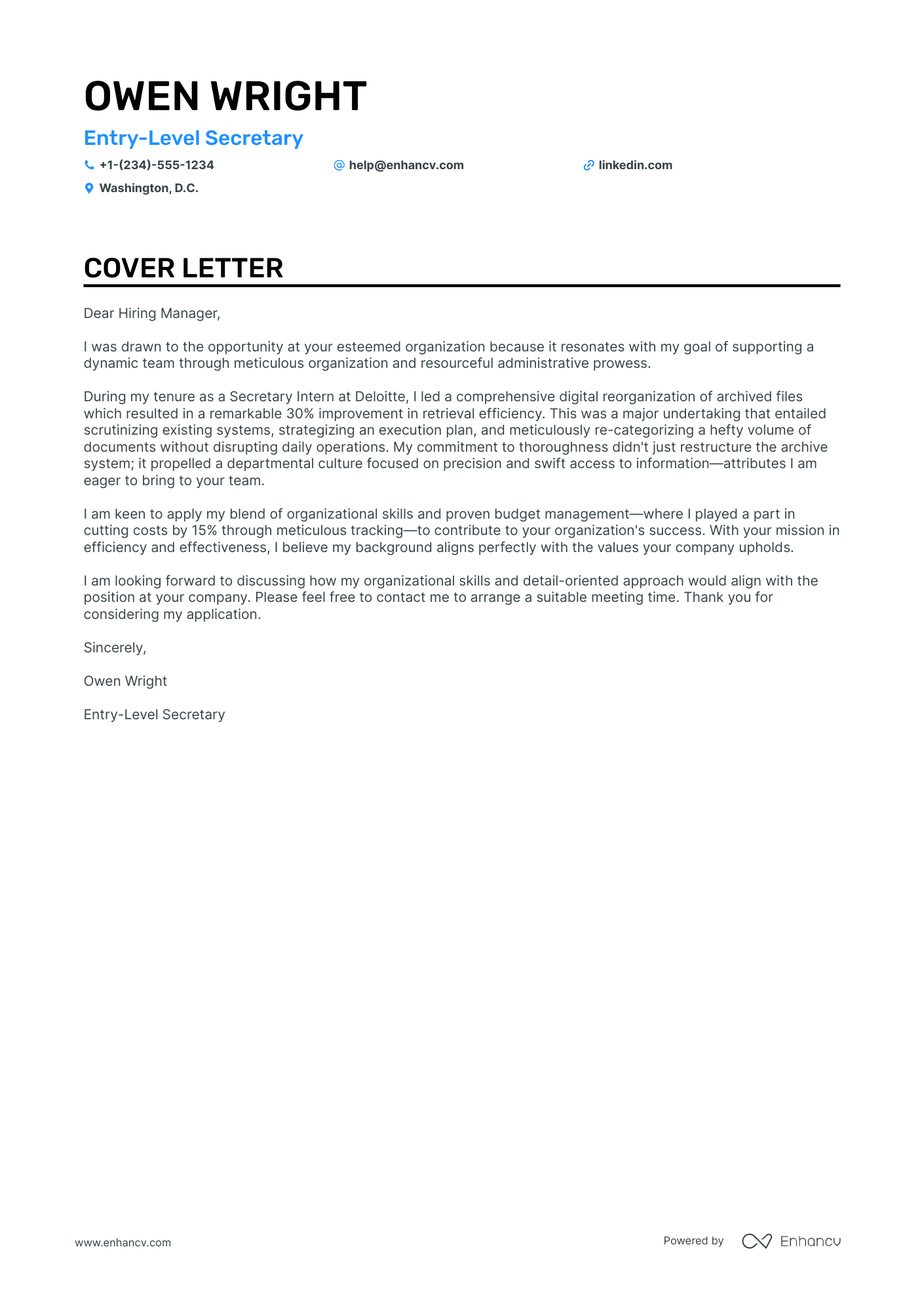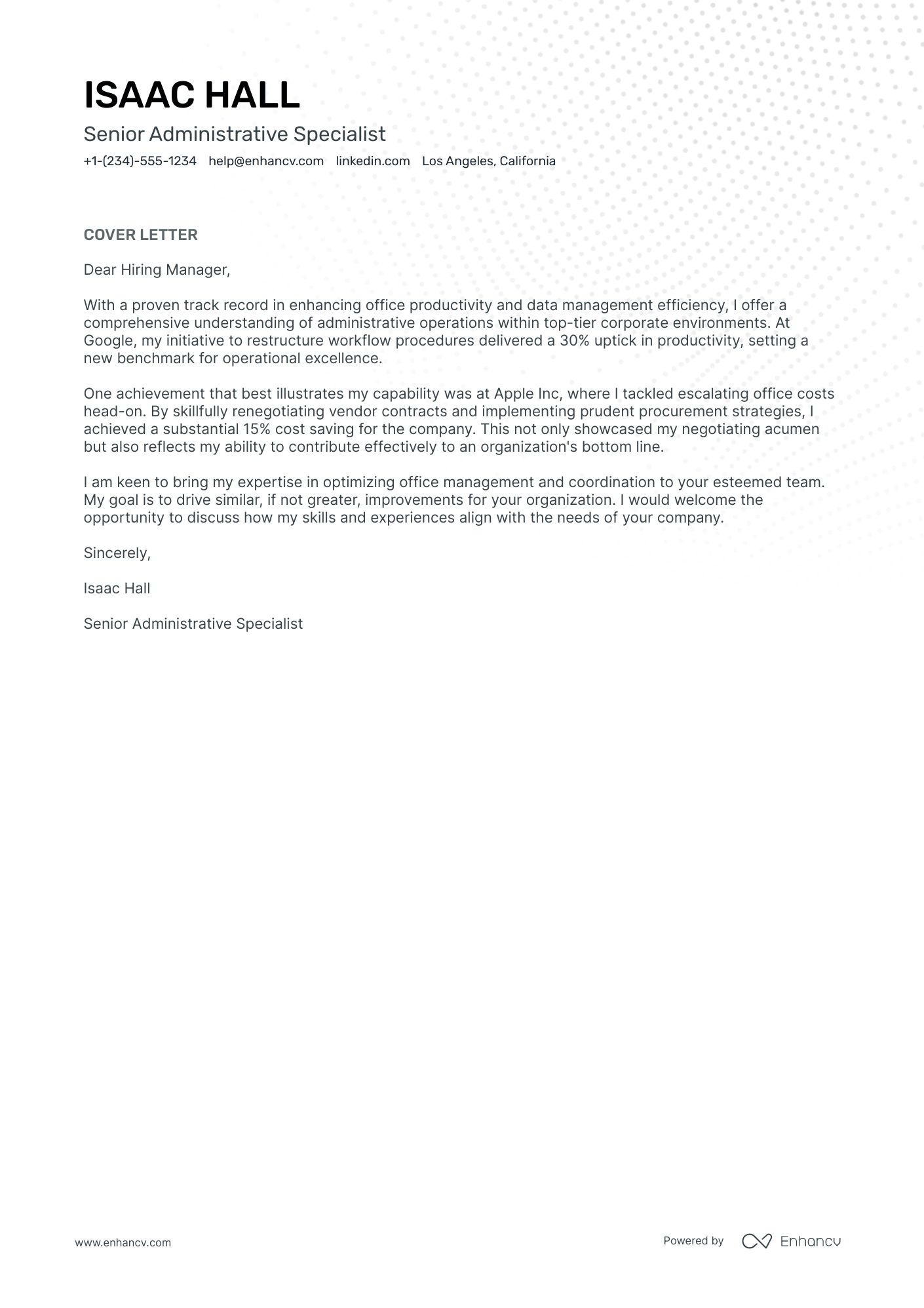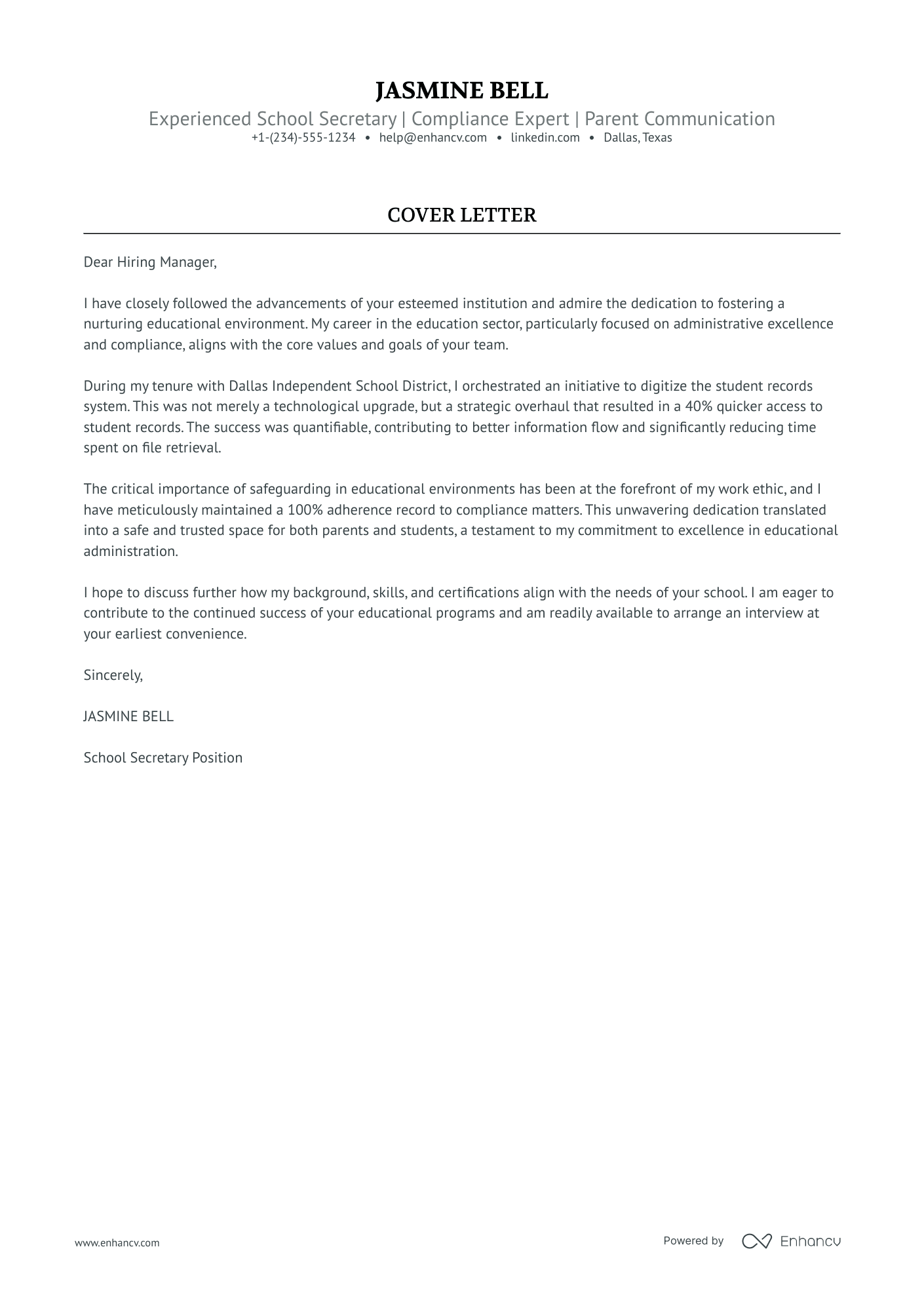Embarking on your job hunt, you're ready to apply for that secretary position you've got your eye on, but there's a hurdle: the cover letter. It's not just a repeat of your resume—it should spotlight your proudest career moment with a compelling narrative. Writing this crucial one-page document can be tricky; it requires striking a balance between formality and authenticity without falling into the trap of tired clichés. Let's navigate this challenge together and craft a cover letter that stands out.
- Write a secretary cover letter that helps you stand out (and get the job);
- Understand how to start and end your secretary cover letter with the appropriate greeting;
- What to include in the body of your secretary cover letter to put your best foot forward;
- Your most important achievements - how to present them as part of your secretary cover letter.
And if you want to make your life even easier, simply drag and drop your secretary resume into Enhancv's AI cover letter generator, and it will write your cover letter for you in just a few moments.
If the secretary isn't exactly the one you're looking for we have a plethora of cover letter examples for jobs like this one:
Drop your resume here or choose a file.
PDF & DOCX only. Max 2MB file size.
Secretary cover letter example
Taylor Foster
Austin, Texas
+1-(234)-555-1234
help@enhancv.com
- Emphasizing key achievements relevant to the role, such as organizing an international business trip, can effectively showcase the candidate's project management skills and their impact on business relationships.
- Demonstrating specific results, like the 30% increase in supplier engagement, provides tangible evidence of the candidate's ability to contribute to company growth and success, making the cover letter more persuasive.
- Mentioning the proactive approach to problem-solving and attention to detail portrays the candidate as a meticulous planner, which is an essential skill for a secretarial role where coordination and administration are paramount.
- Express a strong desire for an interview to discuss contributions in person, which indicates enthusiasm for the role and an eagerness to engage with potential employers more directly.
Five tips on formatting your secretary cover letter
Do you want to make a good impression on recruiters and, at the same time, follow the best industry advice on writing your secretary cover letter?
Make sure to include the following:
- Header and Salutation;
- Introductory paragraph;
- Body paragraph;
- Closing paragraph;
- Signature (this one is up to you).
Remember to use the same modern, simple font for your secretary cover letter as you did for your resume (e.g. Lato, Rubik, etc.)
Ensure your secretary cover letter is single-spaced and is wrapped around a one-inch margin, like in our cover letter templates.
Once completed, use our cover letter builder to export your secretary cover letter in the best format to keep your information intact - PDF.
At the end of the day, your secretary cover letter won't be assessed by the Applicant Tracker System (ATS) software, but by the recruiters. Your information should thus be legible, organized, and follow a structured logic.
No time for a cover letter? Use our free cover letter generator and craft one effortlessly from your resume.
The top sections on a secretary cover letter
- Header: This section includes your contact information and the date, which is essential for the employer to reach out to you and to document when the application was sent.
- Salutation: A personalized greeting addressing the hiring manager by name shows that you have done your research and are serious about wanting the position.
- Introduction: Briefly highlight your enthusiasm for the secretary role and give an overview of your qualifications that demonstrates you understand the importance of the position in ensuring office efficiency.
- Professional Experience and Skills: Outline your previous secretarial or administrative roles and specific skills such as proficiency in office software, communication abilities, and organizational talents that relate directly to the responsibilities of a secretary.
- Closing and Call to Action: Conclude with a strong closing statement that reiterates your interest in the role and invites the hiring manager to contact you for an interview, showcasing your proactive approach which is key as a secretary.
Key qualities recruiters search for in a candidate’s cover letter
- Outstanding organizational skills: Secretaries often manage multiple schedules, handle administrative tasks, and keep everything running smoothly, so strong organizational abilities are crucial.
- Excellent written and verbal communication: Secretaries act as a point of contact and need to communicate effectively with stakeholders at all levels both inside and outside the organization.
- Proficiency in office technology: Familiarity with office software, such as word processors, spreadsheets, and databases, as well as office equipment, is essential for performing daily tasks efficiently.
- Time-management and prioritization: Ability to prioritize tasks effectively and manage time efficiently ensures timely completion of work despite frequent interruptions and varying workload.
- Attention to detail: Precision in tasks like data entry, managing correspondence, and preparing documents is critical to maintain accuracy and prevent oversights.
- Discretion and confidentiality: Secretaries often handle sensitive information; the ability to be discreet and maintain confidentiality is paramount to protect the interests of the organization.
Personalizing your secretary cover letter salutation
Always aim to address the recruiter from the get-go of your secretary cover letter.
Use:
- the friendly tone (e.g. "Dear Paul" or "Dear Caroline") - if you've previously chatted up with them on social media and are on a first-name basis;
- the formal tone (e.g. "Dear Ms. Gibbs" or "Dear Ms. Swift") - if you haven't had any previous conversation with them and have discovered the name of the recruiter on LinkedIn or the company website;
- the polite tone (e.g. "Dear Hiring Manager" or "Dear HR Team") - at all costs aim to avoid the "To whom it may concern" or "Dear Sir/Madam", as both greetings are very old-school and vague.
List of salutations you can use
- Dear Hiring Manager,
- Dear [Company Name] Team,
- Dear Mr./Ms. [Last Name],
- Dear Dr. [Last Name],
- Dear [First Name] [Last Name],
- Dear [Job Title],
How to start your secretary cover letter introduction
The opening paragraph of your secretary cover letter can seem like a real enigma.
Where do you start writing?
In your secretary cover letter introduction, focus on yourself by stating what:
- gets you motivated and excited about the role;
- you like best about the company, from culture to awards.
Write no more than two sentences, which are both authentic and show your enthusiasm for the opportunity.
What comes next: your secretary cover letter middle paragraphs
In the next three to six paragraphs (or the body of your secretary cover letter) you have to prove your unique value.
Most candidates tend to mess up at this stage. They tend to just copy-paste information from their resume.
That's one big no-no.
Remember that when writing your secretary cover letter, it has to be personalized. And, your ultimate aim is to catch the recruiter's eye.
So, look back on key job requirements and write down a list that includes the ones you cover.
Next, select just one key achievement from your professional (or personal) history that meets those advert keywords.
Narrate a story around how you've grown your skill set and knowledge. Also, aim to show the unique understanding or soft skills you bring about, thanks to your past success.
Two ideas on how to end the final paragraph of your secretary cover letter
Closing your secretary cover letter, you want to leave a memorable impression on recruiters, that you're a responsible professional.
End your cover letter with how you envision your growth, as part of the company. Make realistic promises on what you plan to achieve, potentially, in the next six months to a year.
Before your signature, you could also signal hiring managers that you're available for the next steps. Or, a follow-up call, during which you could further clarify your experience or professional value.
Secretary cover letter advice for candidates with no experience
If you're worried about writing your Secretary cover letter and have no professional experience, we sure have some advice for you.
Turn recruiters' attention to your transferable or relevant skills gained thanks to your life and work experience.
Instead of writing about past jobs, focus on one achievement (whether from your volunteering experience, education, etc.) and the skills it has helped you build.
Alternatively, you could focus your Secretary cover letter on your career objectives and goals. Always remember to make those relevant to the job you're applying for by detailing how you see yourself growing as part of the company.
Recruiters would be way more impressed with candidates who fit the job profile and can bring about plenty of skills and vision to the table.
Key takeaways
Writing your secretary cover letter doesn't need to turn into an endless quest, but instead:
- Create an individual secretary cover letter for each role you apply to, based on job criteria (use our builder to transform your resume into a cover letter, which you could edit to match the job);
- Stick with the same font you've used in your resume (e.g. Raleway) and ensure your secretary cover letter is single-spaced and has a one-inch margin all around;
- Introduce your enthusiasm for the role or the company at the beginning of your secretary cover letter to make a good first impression;
- Align what matters most to the company by selecting just one achievement from your experience, that has taught you valuable skills and knowledge for the job;
- End your secretary cover letter like any good story - with a promise for greatness or follow-up for an interview.
Secretary cover letter examples
By Experience
Entry-Level Secretary
By Role







